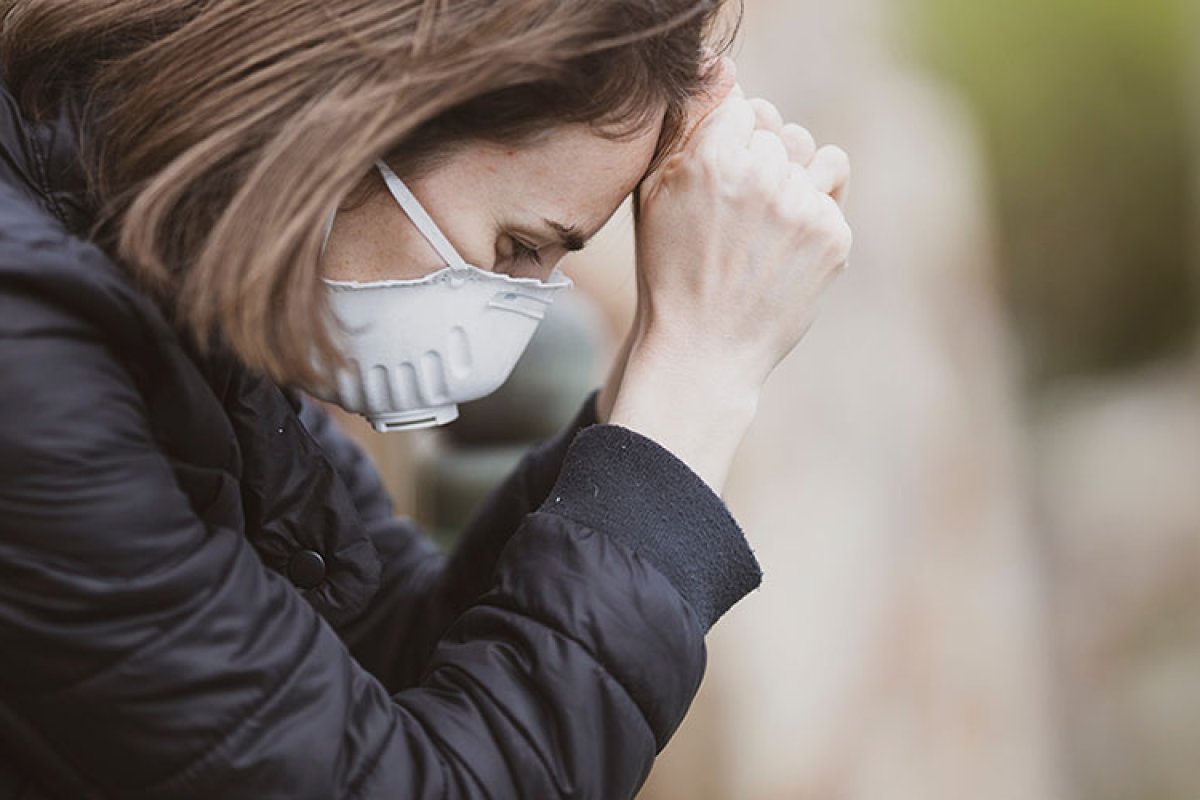
A Normalized Sense of Hopelessness
Making America Great at the Expense of Her Soul
If you or your loved ones have seemed especially sad, angry, or bored during this seemingly unending pandemic season, you are not alone. A study published in June by the National Opinion Research Center reports that the American public’s happiness is at a five-decade low. NORC’s longitudinal research compared a May 2020 survey of Americans’ outlook and emotional health with nearly fifty years of trends in public opinion data from the General Social Survey (GSS). When the data are examined in this larger historical context, they reveal an all-time low in the number of people saying they are very happy (14% in May, down from 31% in 2018). At first glance, this statistic seems at odds with another of the study’s findings—an all-time high percentage of respondents who are satisfied with their family’s financial situation (80%). NORC researchers address this seeming contradiction in their report, suggesting that while people are comparing their current feeling with their own psychological wellbeing before the pandemic, they are assessing their financial situation in comparison to the millions of Americans who have lost jobs and homes during the last three months.
It is not hard to imagine why Americans responding to a survey near the end of May—ten weeks into an unprecedented mass quarantine—described a 25% increase in loneliness, anxiety, and depression. Over 50% of respondents said they felt anxious, depressed, or irritable that week; understandably, people felt more unhappy and lonely in counties with higher numbers of COVID deaths. Nor is it surprising to learn that during that same week in May, Americans were on average 15% less optimistic about the future well-being of our next generation than they had been two years ago, in 2018. But some of the report’s historical comparisons give us pause: how are we to understand the disparity in resilience between our experience of a global pandemic and our response in the aftermath of other crises?
Compared to Americans’ attitudes in the aftermath of 9/11, for example, more respondents report negative emotions and fewer describe positive ones in the wake of the pandemic: “Sixty-seven percent have felt proud during the last few weeks, compared to 81% who felt proud after 9/11. Similarly, only 27% have felt ‘on top of the world,’ while 37% did in 2001. Americans are also less likely to feel pleased and accomplished and ‘that things are going their way’ compared to after 9/11. In terms of negative emotions, 62% of Americans have felt bored, and 34% have felt lonely in the aftermath of the COVID outbreak; just 43% and 27%, respectively, said the same after 9/11.” Significantly more respondents reported serious anger, as well as an increased desire to drink, as a result of COVID stress than following the traumatic shock of the 9/11 attacks.
The NORC survey did not inquire about the particulars of the respondents’ experience with this pandemic season or their individual interpretations of it; nor did the instrument ask for explanations or qualifications of the reactions they registered. The utility of such studies is to measure what is, and not to venture guesses about why. But for students of religion, communities of spiritual practice, and those who are engaged in truth-telling, meaning-making, or the production of historical narratives, these dissonances, contrasts, and gaps in the researchers’ data might be the most instructive part of their report. Are the significantly poorer mental health outcomes represented by this report simply the effect of too much uncertainty, too much worry about contagion, too much time spent alone? Certainly, the limitations placed on the quotidian lives we’ve taken for granted must play a role here. At the same time, the study challenges us to look beyond the obvious, to look for deeper trends, to ask bigger questions. What suffering is at the root of such unhappiness, and where is that reservoir of spiritual wisdom with which human beings have historically endured, and persevered, and come out on the other side? What can we say about the state of the American soul?
Not far from NORC’s offices in downtown Chicago, shootings across the city increased by 75% in the few weeks following NORC’s late May sampling, with 424 shootings in June 2020, compared to 242 in June 2019, according to police statistics. Murders in Chicago rose by 78%, with 89 reported in June 2020 compared to 50 in the same month last year. Such episodes of urban violence reflect the systemic impact of years of poverty, oppression, trauma, and neglect; these are also the communities disproportionately punished by COVID-19. Following this Tuesday evening’s shooting of 15 persons in a crowd of mourners outside a south side Chicago funeral parlor, commentators noted the strikingly nihilistic nature of this summer’s violence: the victims are more often passersby, women, children, even infants. As one of the funeral parlor’s neighbors observed, “there’s a normalized sense of hopelessness now,” depths of sadness and anger that seem to override even the most rudimentary sense of human connection, empathy, or self-restraint.
Between the lines of the NORC study, and in the unremitting rise of Chicago’s weekly summer crime statistics, we all recognize that “normalized sense of hopelessness”—hopelessness that is not simply a country’s response to the tyranny of a virulent illness, or the inevitable vulnerability of those most at risk in every crisis, but an entire citizenry forced to navigate epic challenges while under the capricious rule of an amoral administration that is also bereft of human connection, empathy, or self-restraint. As COVID-19 continued unabated in the majority of our country this month, this administration has denied its impact and obfuscated its science, pursued baseless actions designed to limit immigration and exclude international students, and executed three federal prisoners (the first federal executions in decades). Despite a loudly professed preference for religious organizations and an earlier demand that churches open their doors and fill their pews by Easter, neither our president nor our courts were moved by the statement signed by over a thousand religious leaders calling for a stay of those executions and the restoration of a nation’s fundamental regard for human life and human dignity.
These quiet, almost surreptitious executions at the federal penitentiary in Terre Haute (ironically, the French expression means “high ground”) signal yet another low point in our country’s long history of disregard for the human spirit that is our common bond, our human inheritance, and the sensibility we all share. What might we learn about a country built and bent on economic supremacy, when anger and sadness are surging among those who consider themselves to be financially stable? Perhaps we learn that a nation can gain the world and yet lose its soul. It has taken a pandemic to reveal that the source of our greatness does not reside in dominance, but in our willingness to feel another’s pain—or our own—and respond to that suffering with compassion, with courage, and with the resolve that none of us should live without hope.
Photo Credit: Engin Akyurt.
Sightings is edited by Joel Brown, a PhD Candidate in Religions in the Americas at the Divinity School. Sign up here to receive Sightings via email. You can also follow us on Facebook and Twitter. The views and opinions expressed in this article are those of the author and do not necessarily reflect the position of the Marty Center or its editor.


